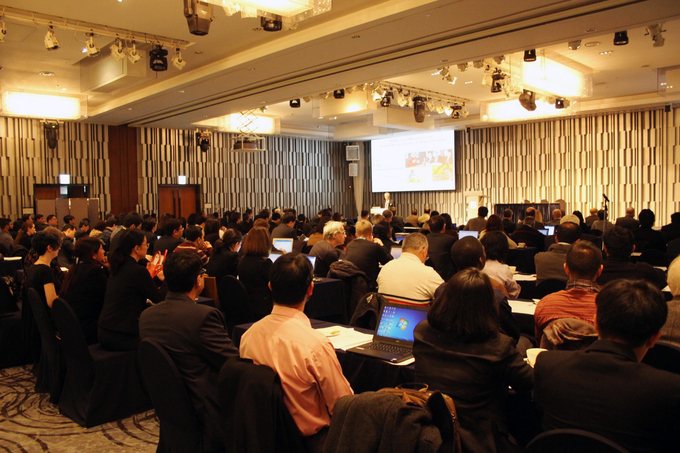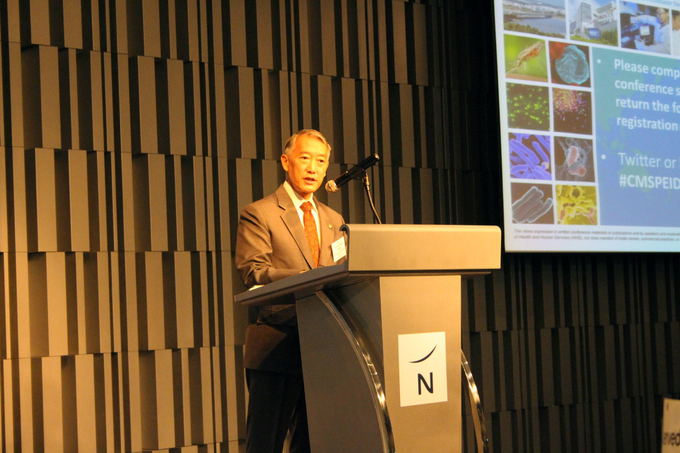미국-일본 의학연구협력프로그램’ 주관 ‘제 19차 환태평양 국제 신종 감염병(EID) 컨퍼런스’
국제백신연구소(IVI), 국내에서 처음 개최되는 세계적 명성의 학술회의 공동 주최

‘미국-일본
의학연구협력프로그램(USJCMSP)’이 주관하는 ‘제 19차 환태평양 국제 신종감염병(EID) 컨퍼런스’가 2월 7일(화)부터 2월 10일(금)까지 4일간 서울 노보텔앰배서더 강남 호텔에서 개최된다. 국제백신연구소(IVI)는 한국에서는 처음으로 개최되는 본 행사의 국내 주최 기관이다.
미국-일본 의학연구협력프로그램은 1996년 이래 EID 컨퍼런스를 매년 국가별로 순환 개최해 왔다. 이 행사는 아시아와 태평양 지역에서 새로운 신종 감염병 위협의 대처를 위한 국제 연구협력을 촉진하고자 감염질환
연구와 관련된 포괄적인 주제에 대한 패널 회의와 논의의 장이 되고 있다.

올해 행사에는 한국, 미국, 일본을 포함하는 환태평양 지역 20여개 국가의 과학자,
정부 및 공중보건 관리, 학계와 공공 및 민간 기관을 대표하는 300여명의 전문가가 참가한다. 연자로는 미국 국립보건원(NIH) 산하 알레르기 및 감염질환연구소(NIAID), 하버드대학
등 미국 기관들과, 국립암센터와 연세대학 등의 국내 기관, 국립감염병연구소(NIID)와 홋가이도대학 인수공통질병통제센터 등 일본 기관들과 중국 관계 기관의 전문가들이 참가한다.
특히 올해 회의는 공중보건에 중요한 세균성 및 기생충 질환에서 새로이 발생하는 항생제 내성 문제에
초점을 맞출 예정이다. 또한 급성호흡기감염(ARI), 암, 콜레라 및 기타 세균성 장감염 질환, 항산균, 기생충
질환에 대한 패널회의에서 관련분야 최신 연구 경향을 소개한다. 또한 본 회의와 질병별 패널회의에서는
관련 주제발표가 이어질 예정이다.

IVI의
제롬 김 사무총장은
“아시아 태평양
지역 유수의 국제
학술회의인 본 행사의
한국내 주최 기관을
맡게되어 기쁘다”며, “이 프로그램은
주제발표와 토론을 통해
전세계 전문가들이 세계보건에서
중요하고 시급한 문제인
항생제 내성 관련
최신 연구성과를 공유하게
된다”고
밝혔다.
7일
개회식에서는 마크 내퍼(Marc Knapper) 주한미국대사관 부대사, 히데오
스즈키 주한일본대사관 총괄공사, 제롬 김 IVI 사무총장 등이
축사와 환영사를 한다. 이 회의는
미국의 NIAID와
일본의 후생노동성, 문부과학성, 일본 의료연구개발기구(AMED) 및 IVI가
공동 주최하며, 빌앤멜린다게이츠재단 등의 후원으로
개최된다.
제 19차 환태평양 국제 신종감염병(EID) 컨퍼런스 일정 (영문)
https://respond.niaid.nih.gov/conferences/USJapanCMSP2017/Pages/EID-Agenda.aspx
EID Agenda
Tuesday, 7 February 2017
7:30-8:30 Registration
8:30-9:10 WELCOMING REMARKS
Hideo Suzuki, Chargés d'Affaires ad interim, Embassy of Japan in Seoul
Marc Knapper, Chargé d’Affaires, U.S. Embassy in Seoul
Jerome H. Kim, Director General, International Vaccine Institute (IVI)
Aikichi Iwamoto, Science and Technology Advisor, Japan Agency for Medical Research and Development (AMED) / Japanese Delegation Chair, USJCMSP
Patrick Brennan, University Distinguished Professor, Colorado State University, U.S.A.
/ U.S. Chair Emeritus, USJCMSP
SHIMAO-TAKEDA LECTURESHIP
Moderators: Kenji Hirayama, Nagasaki University, JapanJong Seok Lee, International TB Research Center, KoreaRapporteurs: Yohei Doi, University of Pittsburgh, U.S.A./JapanWilliam Petri, University of Virginia School of Medicine, U.S.A.
Introduced by Aikichi Iwamoto, AMED, Japan
9:10-9:40 Masakatsu Shibasaki, Institute of Microbial Chemistry, Japan 9:40-9:50 Announcement of USJCMSP 2016 Collaborative Awards
9:50-10:00 Break
10:00-10:10 Brief video presentation: IVI Introduction
SESSION 1 Overview of Antimicrobial Resistance Moderators: Kenji Hirayama, Nagasaki University, JapanJong Seok Lee, International TB Research Center, KoreaRapporteurs: Yohei Doi, University of Pittsburgh, U.S.A./JapanWilliam Petri, University of Virginia School of Medicine, U.S.A.10:10-11:00 Panel Discussion (10 min. talks, followed by discussion) NIH/NIAID and CARB: Combating antibiotic-resistant bacteria
Dennis Dixon, National Institute of Allergy and Infectious Diseases (NIAID), U.S.A.
Overview of AMR in Japan
Kazuhiro Tateda, Toho University, Japan
Overview of AMR in Korea
Seok Hoon Jeong, Yonsei University College of Medicine, Korea
Time for Discussion (20 min.) 11:00-12:00 Lunch Break and Poster Viewing
SESSION 2 Molecular Epidemiology of Antimicrobial Resistance – shorter talks (20 min. each)
Moderators: Dennis Dixon, NIAID, U.S.A. Keigo Shibayama, NIID, JapanRapporteurs: Robert Hall, NIAID, U.S.A. Chie Nakajima, Hokkaido University, Japan
12:00-12:20 The global spread of fluoroquinolone resistant Shigella sonneiHao Chung The, Oxford University Clinical Research Unit, Vietnam
12:20-12:40 The reemergence of schistosomiasis in Sichuan, China despite treatment and control: Integrating next-generation genomics and field epidemiology
Elizabeth Carlton, University of Colorado, Denver, U.S.A.
12:40-13:00 Genetic approaches to cryptosporidiosis a leading cause of global child mortality
Boris Striepen, University of Georgia, Athens, U.S.A.
13:00-13:20 Molecular and phenotypic surveys for multidrug-resistant tuberculosis in South East Asia
Yasuhiko Suzuki, Hokkaido University Research Center for Zoonosis Control, Japan
13:20-13:40 NGS technology for molecular typing and DST of M. tuberculosis Jong Seok Lee, International Tuberculosis Research Center, Korea
13:40- 14:00 Global epidemiology of AMR in bacteria
Yohei Doi, University of Pittsburg, Japan and U.S.A. 14:00-14:20 Discussion
14:20-14:30 Break
SESSION 3 Genomics and Mechanisms of Antimicrobial Resistance – shorter talks (20 min. each)
Moderators: Tim Murphy, State University of New York (SUNY) at Buffalo, U.S.A.Mitsuaki Nishibuchi, Kyoto University, JapanRapporteurs: Takushi Kaneko, TB Alliance, U.S.A. Alison Kraigsley, NIAID, U.S.A.
14:30-14:50 Mobile genetic elements in the spread of resistance: overview and current work on the mobile element behind the MRSA epidemic
Phoebe Rice, University of Chicago, U.S.A.
14:50-15:10 Consequences of drug resistant mutations on the whole genome and physiology (fitness)
Yonatan Grad, Harvard School of Public Health, U.S.A.
15:10-15:30 Reactive oxygen species play an important role in the bactericidal activity of quinolone antibiotics
Deepak Nair, Regional Centre for Biotechnology in Faridabad, India
15:30-15:50 Phenotypic variations of L. donovani in Sri Lanka: Threat of antimony resistance?
Nadira Karunaweera, University of Colombo, Sri Lanka
15:50-16:10 New PK/PD strategies to combat resistance
Brian Tsuji, State University of New York at Buffalo, U.S.A.
16:10-16:30 Discussion
Wednesday, 8 February 2017
8:00-8:30 Registration
LAMONTAGNE-HEILMAN LECTURESHIP
Moderators: Kiyoshi Kita, Nagasaki University, JapanSteve Reed, Infectious Disease Research Institute (IDRI), U.S.A.Rapporteurs: Manabu Ato, National Institute of Infectious Diseases (NIID), JapanJames Kazura, Case Western Reserve University, U.S.A.
Introduced by Gray Handley, NIAID, U.S.A.
8:30-9:00 John Mekalanos, Harvard Medical School, U.S.A.
SESSION 4 New Developments in Recognition and Technologies for Prevention, Diagnosis and Treatment of AMR – shorter talks (20 min. each)
Moderators: Kiyoshi Kita, Nagasaki University, Japan Steve Reed, IDRI, U.S.A.Rapporteurs: Manabu Ato, NIID, Japan James Kazura, Case Western Reserve University, U.S.A
9:00-9:20 Efficacy of topical single radio frequency induced heat therapy (RFHT) in treatment of old world SSG-responsive and SSG-refractory CL caused by L. tropica
Abhay Satoskar, Ohio State University, U.S.A.
9:20-9:40 Colonization and drug resistance in enterotoxigenic E. coli
Michael Lebens, University of Gothenburg, Sweden
9:40-10:00 GeneXpert MTB/RIF and other genetic based tools for surveys of AMR in
Mycobacterium tuberculosis infectionsLinda Xie, National Institute of Allergy and Infectious Diseases, U.S.A.
10:00-10:20 Colistin resistance and MCR-1
Yang Wang, China Agricultural University, China
10:20-10:40 How to discover new medicines in resource-limited therapeutic areas?
Takushi Kaneko, TB Alliance, U.S.A.
10:40-11:00 The microbiome as a tool to prevent transmission and infection due to antimicrobial resistant bacterial pathogens
Melinda Mary Pettigrew, Yale University, U.S.A.
11:00 -11:20 Discussion
11:20-11:30 Break
SESSION 5 Malaria Elimination and AMR
Moderators: Shigeyuki Kano, National Center for Global Health and Medicine, JapanMalla Rao, NIAID, U.S.ARapporteurs: Shinjiro Hamano, Nagasaki University, JapanNadira Karunaweera, University of Colombo, Sri Lanka
11:30-12:00 Mass drug administration to eliminate malaria on islands
Akira Kaneko, NIID, Japan
12:0-12:30 Genomics and drug resistance mechanisms in Plasmodium falciparum population along the China-Myanmar border
Liwang Cui, Penn State University, U.S.A.
12:30-13:30 Lunch Break and Poster Viewing
13:30-14:00 Artemisinin and drug partner resistance: from phenotype to genotype
Didier Menard, Institut Pasteur in Cambodia, Cambodia
14:00-14:30 Molecular epidemiology of Plasmodium vivax malaria in Duffy-negative human in Ethiopia
Guiyun Yan, University of California, Irvine, U.S.A.SESSION 6 Cancer, Infectious Agents, and Antibiotic Resistance
Moderators: Tohru Kiyono, National Cancer Center Research Institute, JapanTed Trimble, National Cancer Institute, U.S.A.Rapporteurs: Marie Ricciardone, National Cancer Institute, U.S.A.Haruhiko Sugimura, Hamamatsu University School of Medicine, Japan14:30-15:00 Collaboration between Helicobacter pylori and Epstein-Barr virus in gastric carcinogenesis
Masanori Hatakeyama, University of Tokyo, Japan
15:00-15:10 Break
15:10-15:40 Helicobacter pylori eradication for gastric cancer preventionIl Ju Choi, National Cancer Center, Korea
15:40-16:10 The human microbiome, gastric cancer prevention, and antimicrobial resistance
Christian Abnet, National Cancer Institute, U.S.A.
16:10-16:40 Contribution of liver fluke and diabetes on development and progression of cholangiocarcinoma
Sopit Wongkham, Khon Kaen University, Thailand
CLOSING REMARKS
16:40-17:00 Masao Mitsuyama, Kyoto University, Japan
Gray Handley, NIAID, U.S.A.
국제백신연구소(IVI)

IVI(국제백신연구소)는 개발도상국 국민, 특히 어린이들을 전염병으로부터 보호하기 위한 새로운 백신의 개발과 보급에 전념하는 세계 유일의 국제기구이자, 국내에 본부를 둔 최초의 국제기구이다. 1997년 유엔개발계획의 주도로 설립된 IVI는 현재 UN과는 분리된 독립적 국제기구로서 세계 35국과 세계보건기구(WHO)를 설립협정 서명국으로 하여 운영되고 있다. 현재 IVI는 콜레라와 장티푸스를 비롯한 설사병, 메르스, 뎅기열 등에 대한 백신 연구를 아시아, 아프리카, 남미 등 세계 20 여개 국가에서 수행하고 있으며, 서울대학교연구공원에 위치한 본부에서 새로운 백신과 면역보강제, 분석기법 등을 개발하고 있다. 자세한 정보는www.ivi.int 참조.
미국-일본 의학연구협력프로그램(USJCMSP)
USJCMSP는 미국 및 일본 연구자들간 아시아의 주요 보건 문제, 특히 개발도상국 국민들을 위한 연구협력을 촉진하기 위해 1965년 설립되었으며, 미국국립보건원(NIH)의 양자 협력 프로그램들 중 가장 오랜 역사를 가진 협력사업이다.







